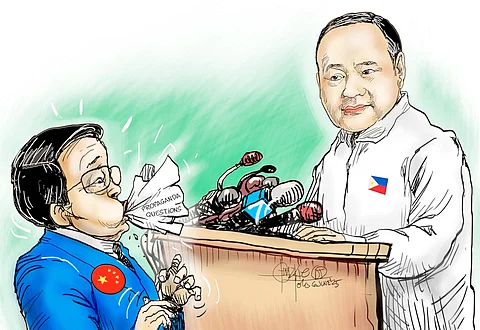
- NEWS
- the EDIT
- COMMENTARY
- BUSINESS
- LIFE
- SHOW
- ACTION
- GLOBAL GOALS
- SNAPS
- DYARYO TIRADA
- MORE

At the 2025 Shangri-La Dialogue held in Singapore from 30 May to 1 June, Defense Secretary Gilberto “Gibo” Teodoro Jr. delivered a compelling and unflinching address that underscored the Philippines’ firm stance on regional security, sovereignty, and adherence to international law, particularly in relation to China’s aggressive behavior in the South China Sea.
During a high-level plenary session, Teodoro fielded pointed and loaded questions from Chinese military officials who sought to paint the Philippines as a puppet of external powers — most notably, the United States.
One Chinese officer provocatively asked why the Philippines could not follow the supposed example of Malaysia and Vietnam who, according to the official, have engaged China in dialogue rather than confrontation. The implication was clear: The Philippines was unnecessarily provoking tensions and refusing diplomatic engagement.
Teodoro did not mince words. He swiftly dismissed these questions as “propaganda spiels disguised as questions,” sharply exposing the underlying intent of the inquiries — to distort facts and delegitimize the Philippines’ rightful position. He emphasized that the Philippines’ actions in the West Philippine Sea are rooted in the defense of its territorial sovereignty and not dictated by foreign influence.
He reiterated that the country’s maritime policy is not about choosing sides in a geopolitical rivalry between China and the United States. Rather, it is about upholding a rules-based international order, especially in light of China’s unlawful and sweeping claims represented by the infamous nine-dash line, which was invalidated by the 2016 arbitral tribunal ruling in The Hague.
Teodoro further asserted that China’s maritime behavior — ranging from aggressive coast guard maneuvers to the installation of artificial features within the Philippines’ exclusive economic zone — has led to a massive trust deficit. He argued that meaningful dialogue is not possible when one party continuously undermines the other through coercion and unilateral actions.
In this context, the suggestion that the Philippines prefers confrontation over communication rings hollow, especially when it is China’s actions that are eroding the very foundation of diplomatic engagement.
Going beyond the immediate bilateral issues, Teodoro used the platform to advocate for broader and deeper regional security cooperation. He emphasized the importance of strengthening ASEAN’s dialogue partnerships — not just with traditional allies like the United States, but also with blocs such as the European Union and the Gulf Cooperation Council.
He called for these partnerships to develop shared legal frameworks and cooperative enforcement mechanisms to deter unilateral and illegal maritime actions.
Teodoro also touched on global governance reforms, proposing wider participation of United Nations member states in the Security Council. He argued for the curtailment of the veto power — often used by powerful nations to stall progress — especially when such actions jeopardize the security interests of smaller, less influential states.
The defense secretary’s forthrightness and clarity of purpose resonated with many attendees, earning him applause and reinforcing the Philippines’ role as a vocal advocate for international law and regional stability.
His message was not only a direct rebuttal to China’s disinformation but also a principled call to uphold sovereignty, rebuild trust, and pursue cooperative security in the increasingly complex Indo-Pacific geopolitical landscape.
